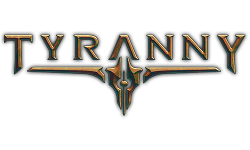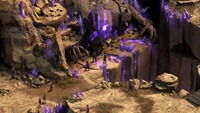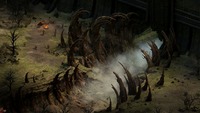|
|

|
PLATFORM
|
PC
|
BATTLE SYSTEM
|

|
INTERACTION
|

|
ORIGINALITY
|

|
STORY
|

|
MUSIC & SOUND
|

|
VISUALS
|

|
CHALLENGE
|
Adjustable
|
COMPLETION TIME
|
20-40 Hours
|
|
OVERALL

|
+ Unique Setting
+ Actual Moral and Political Nuance
+ Tooltips for Setting and Story Clarity
- Glitchy Questing
- Loading...Forever
- Lack of Voice Over
|
Click here for scoring definitions
|
|
|
Long ago in the distant past of 1999 there was a school of computer RPGs that had an isometric perspective, a firm foundation in tabletop mechanics, and extensive dialogue trees. These were divided into two types, instant classics that remain core texts of the genre like Baldur's Gate and Fallout, and forgotten garbage like Nox, Konung, and Gryphon Kings 2 (one of those is made up to emphasize how badly these have been treated by time). Tyranny, a new release in that mold from Obsidian Entertainment, creates a new category for itself: perfectly adequate.
The story sets the player as a Fatebinder in the service of the Tunon of Justice to Kyros, the nigh-godlike Sorcerer-King (or Witch-Queen, it's unclear) of almost an entire continent. The gears of conquest have ground to a halt because of infighting between the two factions leading the charge against the sole hold-out nation; one is a well ordered force of elite combatants prone to acts oppression and occupation, the other a horde of berserkers that recruit using cult tactics and burn everything they don't like. Oddly enough, they have a hard time working together and spend most of their time undermining each other's strategies. It's down to the player to gets this back on track, or everybody in the nation will die (perks of serving the Wizard-Empress) — it's like be the new project manager in trouble corporation, but in hell. Along the way the Fatebinder will collect a colourful of hangers-on, negotiate with the locals and put a boot heels to the necks of the unruly . . . or not there are plenty of equitable solutions to be found over the course of the journey — all this while unravelling the mystery of Kyros' powers.
The advertising for this title proudly claims that "evil has already won," but the player choices are far more nuanced than burn or pillage. Every character, faction and some magic items have a measure of favor and fear for the player, each are tracked separately, and come with perks either mechanically or in terms of dialogue resolution. It an interesting alternative to the moral compass of most games. Players get dragged into a morass of an inter-personal and -"sectarian conflicts and have to trade favours against one another in hopes of sorting things out for the glory of the empire. The main character's position mixes up the RPG norm by giving the player actual authority. The Fatebinder isn't stuck running errands to get people to open doors, but with real bargaining power and the force of arms to back up their threats. The fact that favourable and unfavourable actions are counted separately for perks gives the player more options to work the carrot and the stick in resolving quests.
 Second Biggest Dead God I've Ever Seen.
Second Biggest Dead God I've Ever Seen.
|
|
For gameplay, Tyranny is a flip of the gameplay engine of Pillars of Eternity without much modification. Combat plays out in classic infinity engine pause and play style, with characters having a hotbar full of special moves that recharge over time. There's some interesting backend optimization that can be done in terms of speeding up the timers but the game isn't so difficult that players really need to fuss over the fiddly bits much. Unique to this game is that based on approval ratings within the party the Fatebinder can do combo moves with other characters, these tend to be once per encounter affairs that are far better than anything else the characters could accomplish with a bit more animation flash than other attacks.
Tyranny's magic system is worth noting in that it opts for hermetic spells with heavy amount of customization. Base sigils are combined with modifiers and accents for specific effect and add-ons i.e; a healing rune with area effect and a quick recharge time versus a single target ranged earth spell with a knock down effect. There's a lot of flexibility in terms of what you want each spell to accomplish and every character has at least two spell slots so all magical bases can be covered pretty well.
Visually, Tyranny is a really solid effort. Considering that the bulk of the game's art assets are flipped from Obsidian's previous title Pillars of Eternity and the bulk of the environments are magically blasted badlands every area has it's own visual flair — dungeons are especially memorable with some really great lighting effects not usually seen in isometric quasi-3D games. The art direction does try to shake things up from the norm for the game's sub-genre by leaning art on a Classic Imperial aesthetic in the Kyros' forces; togas and segmentata abound in character costuming, that paired with the setting's notion that iron is a recent military super-technology sells this world as something more ancient and harsh than most second-hand Tolkien in RPGdom.
There's very little in terms of voice acting, even by the standards of the turn of the century CRPGs this game is aping. What makes it frustrating is that most of the voiced lines are given to the antagonists of the game, rather than the player companions, however well done the performances are. It sucks a lot of the fun and charm out of the games that inspired this one by not having the emphasis on the characters players spend the most time with. The soundtrack does have a few catchy numbers to keep roaming around the landscape interesting. Audio-wise, the game shows the limitations of production.
 Here Stands The Quest of Easily Broken Secondary Objectives.
Here Stands The Quest of Easily Broken Secondary Objectives.
|
|
There are some technical flaws that kept players from getting into the game or even dragged out of play at points; sometimes literally. Tyranny has long loading times, especially the first load after launching the game, it seemed to hang for minutes at a time. Also quests have habit of breaking irreparably if the player doesn't allow the journal prompts to load before exiting an area; more than once I would turn in an objective, only to have the next event fail to load because I had loaded into a new area before the quest objective alert had cleared the screen. There is, however, a bit of technical brilliance in this game: all of the game's proper nouns and jargon is tool-tipped in every instance whether dialogue text or in menus. Any instance of a game specific term can be hovered over for a short explanation, RPGamers will never be lost in the game's extensive world-building or lose track of a particular NPC's name and significance, this needs to be done more often.
Tyranny, is fun little throwback to an older style of game. It does it well and it does it without having to cash in on a particular brand or nostalgic sentiment. It presents a brand new world in a compelling and understandable way. It showcases a much more nuanced take on being the bad guy than games tend to do. I found myself reminded more of Unrest than Baldur's Gate while playing this game and that is a good thing.
Review Archives
|









